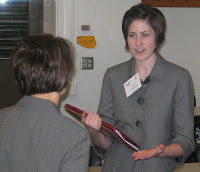 |
| AIM Alumni: Mike Carlson and Katie Koutnik |
2008 AIM alumnus, Mike Carlson, an Investment Analyst at Cascade Investment in Seattle, Washington, visited the AIM program on Monday, November 29. He met with the AIM students in the Class of 2011 during their class meeting - and then he talked informally with the newest AIM students in the Class of 2012.
Dr. David Krause, AIM program director said, "It was great to see Mike again. Having him in the classroom was a treat for the students since he is able to talk about investments in terms the students can relate. He has gained some valuable experience at Cascade Investment and I look forward to watching Mike's career develop. Mike is making steady progress towards his CFA charter and I expect him to be continue to prosper in the investment industry."
Mike played on the Marquette men's soccer team during the 2004-2007 seasons. He is from Glendale, Wisconsin and attended Nicolet High School. Dr. Krause added, "I know it was a treat for Mike to make it back to Wisconsin for Thanksgiving. It was great to see him again and I hope we continue to place more Marquette students in Seattle with Cascade."
"The AIM students talked with Mike about various topics, including the current events that were impacting the market," Krause said. "We discussed the North Korean surprise artillery attack on South Korea and the implications on the global market. Mike commented that the tension with North Korea is one of the reasons why South Korea is still considered to be an emerging market and continues to carry high political risk for investors. It further explains why the South Korean stock market trades at a significant valuation discount to the Asian region. It was clear to the students that Mike had an excellent grasp on the capital markets."

























































